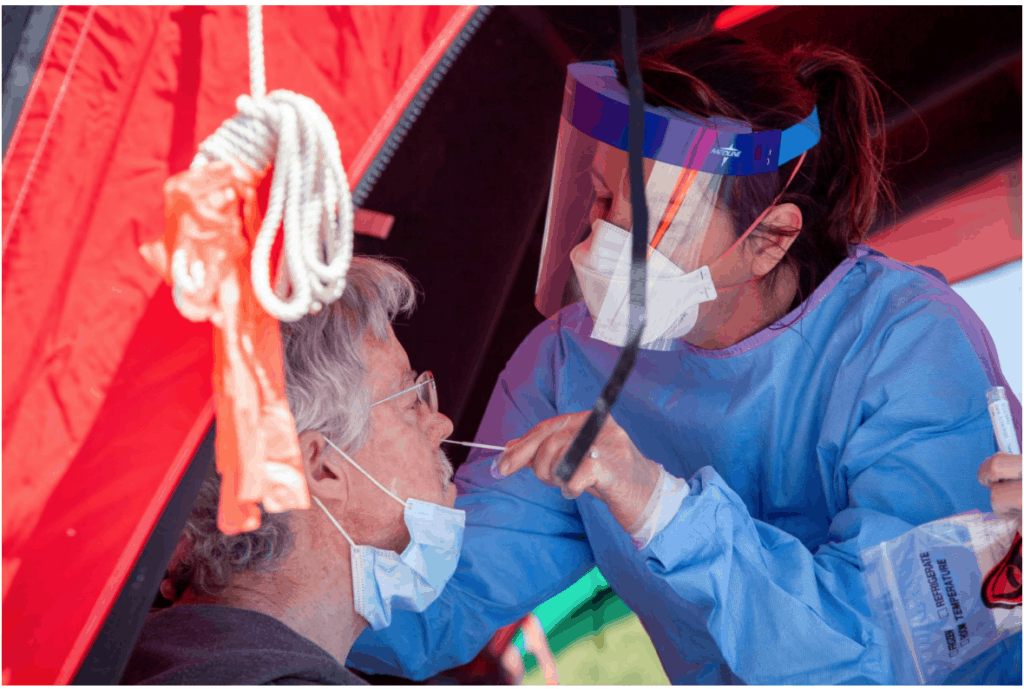
By Katie Jickling
When Elise Shanbacker recently came down with head cold symptoms, she decided to get a Covid test — just in case. Easier said than done.
All of the Vermont Department of Health 26 scheduled pop-up testing sites for the next two weeks were booked, with the exception of an Aug. 10 event in Canaan. There were no local options. Ultimately, the Vergennes resident drove 45 minutes to Walgreens in Essex Junction on Monday, and waited in line for two and a half hours to get a self-administered nose swab test.
Shanbacker took to social media to express her frustration. “People waiting in line behind me for well over an hour were turned away. Everyone who wants a test can get one?” she wrote on Twitter, questioning the state’s assertion that testing is widely available.
Indeed, the facts appear contradictory. The state is conducting more than 1,000 tests a day — as many as it has ever done. Vermont ranks number one in the U.S. in testing availability and maintains the lowest rate of positive cases. Still, Vermonters continue to struggle to get a Covid test.
The state has enough supplies and inventory for at least the next month, Gov. Phil Scott said at a press conference Tuesday. But a growing demand, evolving research around testing, and the patchwork of screening options have created disparities for who can get tested and when.
Shanbacker’s story isn’t an anomaly.
After Carina Sobel returned from Texas, she was refused a test by her primary care doctor at UVM Family Medicine because she didn’t have symptoms. Some testing sites didn’t have an opening; others wouldn’t take asymptomatic patients. Ultimately, she drove from her home in Colchester to an urgent care clinic in New Hampshire, where she tested negative.
Others reported waiting more than a week for results, staying home from work as they wait for the final word confirmation on whether they’re healthy. After Rachel Grandon came down with flu-like symptoms, it took five days for her to get a test. People with symptoms can’t go to the state’s pop-up sites, she was told. Her primary care doctor didn’t return calls. Ultimately, she got an opening at an urgent care center in Williston.
Even then, the test results took seven days. Grandon didn’t go to work until she got confirmation that she didn’t have the virus. “It was a frustrating and stressful process to say the least,” she said.
As the state’s testing options have grown, each site has developed its own requirements for patients. Some hospitals require a doctor’s referral; some sites ask for an appointment, or allow drive-up visits. Some sites only see people with symptoms. Others turn them away. To make matters more confusing, there is no central coordination between sites or scheduling statewide.
“It’s a big, heavy complicated system that is getting rolled out as demand is increasing,” said Department of Health spokesperson Ben Truman.
Some testing protocol varies even within a single site. Doctors at the University of Vermont Medical Center can make their own decision about who to refer to their testing site at the Champlain Valley Expo, said hospital spokesperson Annie Mackin.
Cindy Morgan, of Shelburne, said her daughter’s pediatrician at UVMMC approved a test, but her own doctor at the same hospital turned her down. She wanted both of them to get tested before she left to drop her daughter off at college in Tennessee, she said. “Clean Covid tests seem like the most responsible thing we could do,” she said.
Many of the hospital’s tests are used for patients scheduled for a medical procedure, Mackin said.
Meanwhile, more Vermonters are signing up to get their nose swabbed. Why? “People want to get tested,” said Truman. Likely demand is up because of a combination of factors, he said: increased awareness of the tests, vacationers arriving or returning to Vermont, and college students coming to town.
The surge in interest has filled the pop-up sites. It’s also resulted in more drive-through tests at places like Gifford Medical Center in Randolph, said spokesperson Ashley Lincoln.
The state hadn’t intended to provide screening for all Vermonters. “Pop-ups are supposed to be filling a gap in testing opportunities,” Truman said.
A handful of pharmacies have stepped up: The Walgreens in Essex Junction, where Shanbacker got her test, started offering Covid tests two weeks ago. Kinney Drugs in Newport also provides tests. So far, the state is hoping to persuade more pharmacies to offer the tests.
Clear Choice MD, an urgent care clinic, has been offering Covid tests for months.
The state has the testing process down to a science, multiple sources say. Lines are minimal, results are quick — often within 24 hours. “Coordinated, swift and responsive,” said Kitty Wade, who got a test at Champlain School in Burlington.
The state process will continue to evolve, said Health Commissioner Mark Levine at a press conference Tuesday. Officials are keeping an eye on supply of testing materials and diversifying their vendors, as cases in other states spike and demand for the tests rise around the nation. So far, the supply continues to be steady, Scott added.
The Vermont Agency of Digital Services is working to develop a website that includes every testing site, Truman said.
Many states continue to provide Covid tests only to people with symptoms, but that wouldn’t be the case in Vermont, Levine vowed. If Vermont reneged on its promise to provide a test to anyone who needed it, officials would lose track of Vermont’s positivity rate. The state would also be “disappointing all those people,” Levine said.




